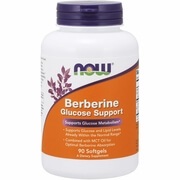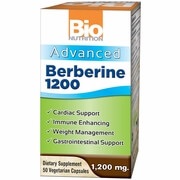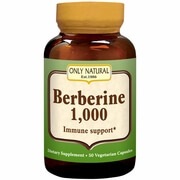Berberine

Berberine is an alkaloid substance extracted from the roots of a few plants belonging to the Berberidaceae family, like barberry (berberis vulgaris) and mahonia (mahonia aquifolium), which is an ornamental shrub, and plants like yellowroot (hydrastis canadensis) which is a perennial herbaceous plant, and huang lian (coptis chinensis) one of the 50 essential herbs of traditional Chinese Medicine.
We are talking about plants that have been used in traditional Chinese Medicine for 3.000 years.
Modern medicine, has been rediscovering the benefits of these plants appreciated for thousands of years.
Berberine is a valuable natural alternative to statin, which is administered to patients suffering from high cholesterol levels.
Let’s go deeper now and see berberine benefits and side effects
Berberine action mechanism and beneficial effects
Studies carried out on animals suffering from diabetes showed the effectiveness of this substance in boosting learning and memory.
Also, berberine has a neuroprotective action and might be effective to treat pathologies associated with neuroinflammation.
It benefits the bowel
Berberine is anti-diarrheal: this property may stem from its ability to slow down the transit in the small intestine.
This normalizing effect on the bacterial flora proved effective in mice, as it improves hepatic steatosis.
It has antidepressive effects
Berberine acts like an antidepressive agent, by boosting key brain chemicals in the hippocampus, and in the pre-frontal cortex of the brain.
Specifically, this substance inhibits monoamine oxidase, an enzyme oxidizing serotonin.
According to a few studies carried out on animals, berberine might be effective to soothe depression and anxiety related to morphine addiction.
It is a notable anti-inflammatory
Both in the laboratory and in living organisms, berberine proved to have anti-inflammatory properties.
It improves glycemia stability
This substance is a valuable option to treat type 2 diabetes, yet it has a different action mechanism than medications like metformin, because berberine:
-increases insulin levels,
-regenerates pancreas cells,
-promotes antioxidant enzymatic activities,
-reduces cellular damage.
Berberine reduces glycemia on an empty stomach, triglycerides, apo b, LDL-C total cholesterol, and what is more it improves glucose tolerance.
Berberine improves insulin sensitivity, inhibiting lipidic accumulation, and inhibits body fat production through regulating C/EBP, CHOP, and DEC2 inhibitors.
It promotes weight loss

As regards a study carried out on the correlation between berberine and weight loss, obese patients were administered 500 mg of berberine thrice a day for twelve weeks: the result was an average 2-kilo weight loss, besides a significant improvement in cholesterol and triglycerides levels.
In another three-month study carried out on obese patients suffering from metabolic syndrome, those patients were administered 300 mg of berberine, thrice a day: it resulted in abdominal fat loss and their BMI went down from 31.5 to 27.4.
It has anti-cancer properties
Berberine has given promising results also as an anti-cancer agent: it can eliminate cancerous cells and inhibit their proliferation.
It has potential as an alternative to chemotherapy to treat neoplasms.
Berberine might also be used synergistically with conventional anti-cancer treatments: a few laboratory tests proved it can make many types of cancerous cells sensitive to duxorbicin, a conventional chemotherapeutic medication.
Improves cholesterol levels
Berberine promotes a proper balance of cholesterol levels.
Combining these substances with other nutraceuticals, reduces total cholesterol and LDL cholesterol levels and insulin resistance.
It is safe to state berberin is an actual alternative to statins.
It lowers blood pressure

Berberine lowers blood pressure and dilates blood vessels, proving to be a potential treatment for high blood pressure.
It is effective regarding treating arthritis

In animals, berberine is effective with regard to treating osteoarthritis and rheumatoid arthritis.
It protects the liver
In mice, berberine protects from liver fibrosis caused by several toxic agents.
Regarding human beings, a study carried out on 184 patients showed berberine was beneficial with regard to treating non-alcoholic hepatic steatosis.
It is anti viral
Berberine might be effective with regard to treating A influenzavirus; it is also effective with regard to treating Herpex Simplex virus.
Prevents cardiovascular pathologies
Berberin has potential with regard to treating various cardiocirculatory issues, among which:
arrhythmias,
cardiac hypertrophy,
myocardial infarction,
irregular heart rate,
atherosclerosis.
Also, it can reduce the plaque build-up in the arteries.
Berberine has also shown protective effects on the myocardial cells damaged by stroke.
This substance has reduced death rate in patients suffering from congestive heart failure.
It is an anti-biotic
Berberine is effective in treating lots of pathogenic organisms, like for instance:
staphylococcus aureus,
aeruginosa bacterium,
escherichia coli bacterium
candida albicans fungi.
Prevents Alzheimer’s disease
Berberin inhibits beta-amyloid and plaque build-up, that are peculiar characteristics of Alzheimer’s disease.
It prevents and stops colitis and inflammatory bowel diseases (IBD).
Berberine is the key anti-inflammatory agent in a traditional Chinese medicine preparation to treat ulcerative colitis.
It is parasiticide
Berberine has parasiticide effects on anaerobic protozoa.
It laboratory tests. It proved effective against trichomonas vaginalis and toxocara cani.
Contradictions and side effects
After taking berberine, some patients showed mild side effects on the digestive system:
the stomach issues (nausea and diarrhea) vanished when berberine was taken after meals;
costiveness improved with a reduced dose.
Berberine should not be given to newborns, as it can cause brain damage, or to pregnant women and women who are breastfeeding (it could damage the fetus or newborn).
Berberine supplements
Before taking berberine supplements, it is advisable to seek medical advice, as interactions with other drugs may occur.
As with any other supplements, it should not be used as a substitute for a varied and balanced diet.
Best berberine supplements:
Berberine Glucose Support, 90 Softgels, NOW Foods

NOW Berberine Glucose Support
- Supports Glucose Metabolism.
- Supports Glucose and Lipid Levels Already Within the Normal Range.
- Combined with MCT Oil for Optimal Berberine Absorption
Not manufactured with yeast, wheat, gluten, soy, milk, egg, fish or shellfish ingredients. Produced in a GMP facility that processes other ingredients containing these allergens.
Suggested Usage:
Take 1 softgel 3 times daily with food
Advanced Berberine 1200, 50 Vegetarian Capsules, Bio Nutrition Inc.

- Dietary Supplement.
- Cardiac Support.
- Immune Enhancing.
- Gastrointestinal Support.
- Vegetarian Formula.
- Made in USA
Free of gluten, yeast, corn, dairy, salt, soy and preservatives.
Suggested Use:
Take two (2) vegetarian capsules once daily with a meal or as directed by a health care professional.
Berberine 1000, Dietary Supplement, 50 Vegetarian Capsules, Only Natural Inc.

- Immune Support.
- Dietary Supplement.
Free Of: yeast, corn, dairy, salt, gluten, sugar, soy and preservatives.
Suggested Use:
As a dietary supplement, take two (2) vegetarian capsules once a day with a meal or as directed by your health care practitioner.
Conclusion
Berberine is an alkaloid substance extracted from the roots of a few plants belonging to the berberidaceae family; it has been used in traditional Chinese Medicine for more than 3.000 years.
In 2004 early studies on berberine were carried out, and it was proposed as a new active compound to lower total cholesterol in the bloodstream. Actually, it lowers cholesterol bowel absorption and increases cholesterol excretion carried out by the liver through the bile.
Berberine benefits are so many, whereas its side effects are few:
Berberine boosts learning and memory, benefits the bowel and has antidepressant effects;
It is a notable anti-inflammatory and promotes glycemia stability.
Berberine promotes weight loss, has anti-cancer properties, improves cholesterol levels and lowers blood pressure; it protects the liver and prevents cardiovascular pathologies.
Berberine should not be given to newborns, as it can cause brain damage, or to pregnant women and women who are breastfeeding (it could damage the fetus or newborn); it is advisable to take berberine after meals, in order to prevent side effects like stomach issues (nausea and diarrhea).
Sources: https://www.verywellhealth.com/

